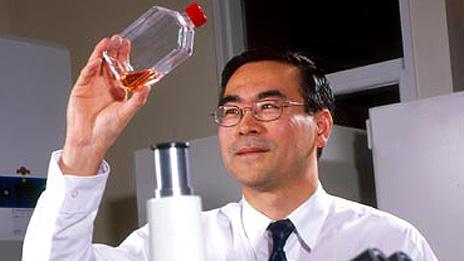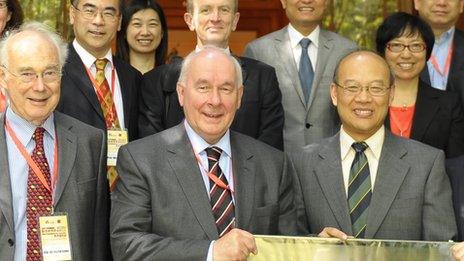Cardiff University in joint cancer study with Chinese experts
- Published

Prof Wen Jiang said some differences in cancer between the UK and China are harder to understand purely down to lifestyle changes
A cancer researcher believes a link-up between Cardiff University and the two largest centres of cancer studies in China could result in significant advances in treatment.
Professor Wen Jiang helped broker the deal between Cardiff's School of Medicine, Peking University, and Capital Medical University in Beijing.
Prof Jiang qualified in China but has spent 17 years working in Wales.
He said cancer differences between the UK and China will be studied.
Prof Jiang believes that the joint initiative will not only pool best practice, but will also help to understand cancer better, by comparing the differences in the conditions suffered by British and Chinese patients.
"China has an excellent record in training highly-skilled surgeons to a phenomenal standard in existing techniques," said Prof Wen Jiang.
"We can learn a great deal from the Chinese education programme and the exceptional number and quality of surgeons it produces.
"Conversely Britain is much more advanced on the research front, and we're in a position in Cardiff to share the theoretical know-how we have developed into cancer on a cellular level."
However, Prof Jiang believes it's the differences between the most common types of cancer found in Britain and China which could prove the most insightful part of the joint research.
"Many of the differences are down to lifestyle choices, and in these areas we're seeing Chinese statistics moving closer to western figures as the economy there becomes more prosperous," he added.
"For example, 20 years ago instances of lung cancer were a fraction of Britain's, but as more Chinese take up smoking there's an increasing convergence.
"Similarly there's an increase in bowel cancer as red meat becomes more affordable.
Highest accolade
"However some differences are harder to understand and require more joint investigation.
"Chinese breast cancer cases are a quarter to a third of British levels, whereas liver and stomach cancer is much more prevalent. There's far too much of a discrepancy to be purely down to lifestyle, and so we need to start looking for the underlying genetic factors."
To mark the joint project, Peking University has granted its highest accolade, honorary professorships, on Prof Jiang, along with Cardiff's Prof Sir Martin Evans who won the 2007 Nobel Prize for Medicine after discovering the properties of stem cells.
If the joint research into cancer is as successful as is hoped for, then the project could be extended to embrace other bio-medical disciplines, such as infectious and immunological diseases, neurology, dentistry, nursing and tissue repair.

The collaboration between Cardiff, Peking and Capital Medical Universities could change the way cancer is treated
- Published4 January 2012
- Published1 November 2011